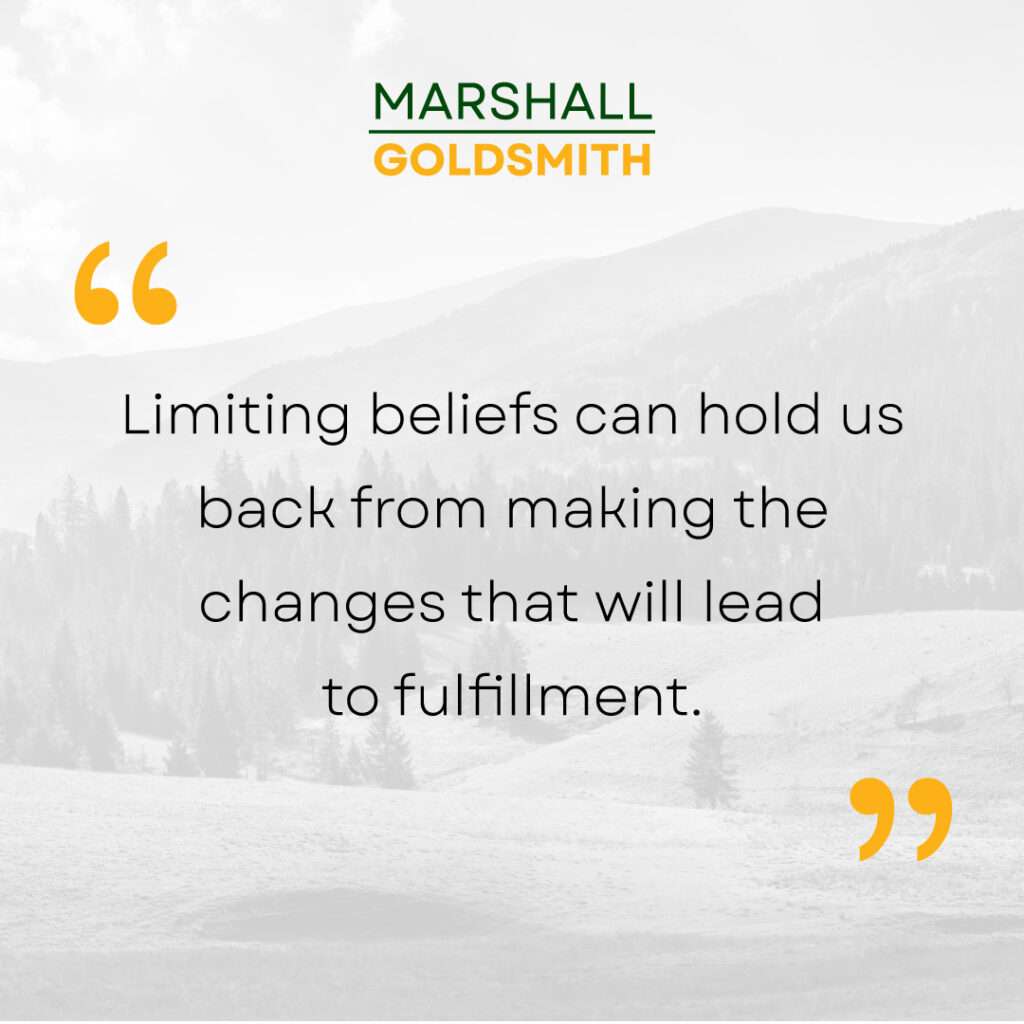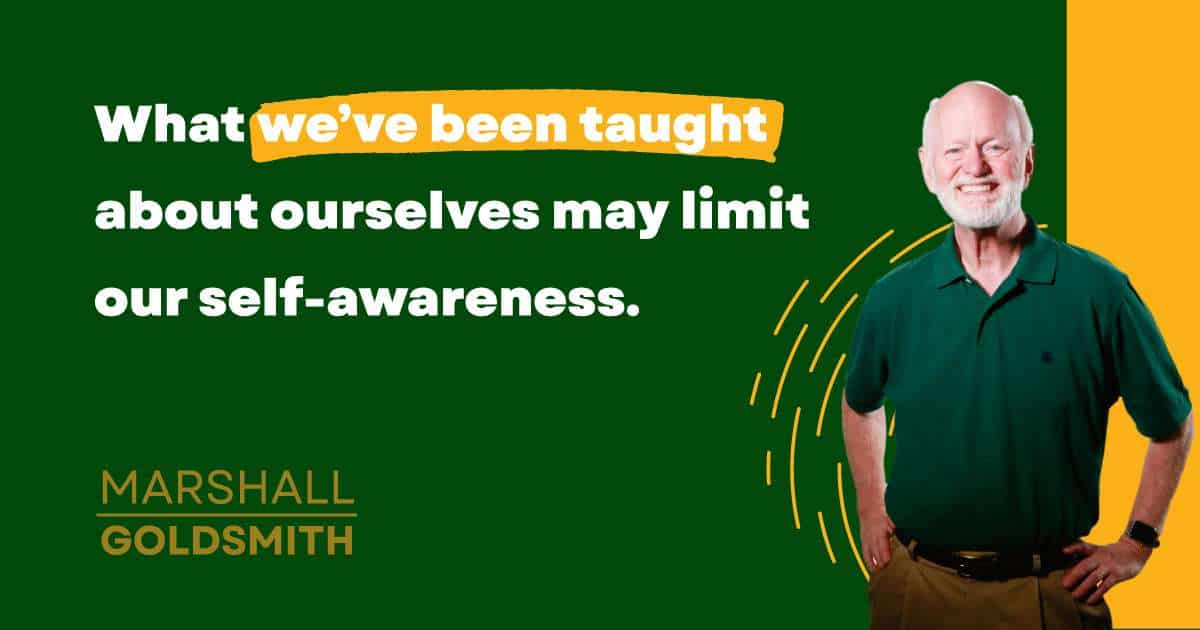Playing Favorites By Marshall Goldsmith There’s a reason I devote...
Sometimes the things that keep us from creating our own life is the way we were taught, or the way we were raised. We default to those learned characteristics, which can lead us into assuming we’re not capable of change.
In a way, what we’ve been taught about ourselves may limit our self-awareness. This is a form of limiting belief that can hold us back from making the changes that will lead to fulfillment. We all need encouragement, and many times we seek it — but sometimes we also need to realize that we are more than we believe we are.
When she was 101, Julia Hawkins set a running record: She finished the 100-meter dash in 39.62 seconds. Two years later, she competed in the 50- and 100-meter dash races in the National Senior Games in Albuquerque. She is believed to be the oldest woman to formally compete on an American track. She took up running at the age of 100, after finding that cycling was becoming too strenuous for her at her age.
Last year, at the age of 105, Ms. Hawkins set the first World Masters Athletics record in the women’s 105+ age category in the 100 meters, when she ran in the Louisiana Senior Games, completing her race in 1 minute 2.95 seconds.
So, who are we to think we’re too old or too set in our ways to change?
It’s not only age that might hold us back in our minds — it’s attitude.
Here’s something I have found in my years of coaching, and through my own life experiences: Our programming locks us in place.

I grew up in Valley Station, Kentucky, thirty miles south of Louisville, along the section of the Ohio River that forms the Indiana border. I was my mother’s only child, and she devoted herself to shaping my childhood persona and self-image.
She was an elementary school teacher who valued brains over brawn. She programmed me to believe that I was the sharpest kid in town. In addition, perhaps to prevent me from becoming an auto mechanic or electrician or any other kind of skilled craftsman, she regularly reminded me that I had no eye-hand coordination or mechanical skills. Thus, by middle school, I had a talent for math and for acing standardized tests, but I was terrible at anything mechanical or athletic. I couldn’t change a lightbulb, and the one time in Little League that I actually made contact between ball and bat—it was a foul ball—I received a standing ovation.
Fortunately, I responded to my mother’s programming with an unshakable faith in my intelligence. Unfortunately, I also developed an unpardonable self-assurance that I didn’t need to try very hard at school. I learned that I could coast and still pull down decent grades.
This lucky streak continued through college at Rose Hulman Institute of Technology and the MBA program at Indiana University—and emboldened me (despite my years of suboptimal effort for academic studies) to seek a PhD at UCLA. But I could not articulate why I needed a doctorate in organizational behavior or what I would do with it. Coasting had gotten me this far, I reasoned. Why not see where continued coasting could take me?
At UCLA, I was blessed with classmates who were my intellectual superiors and professors who were not only light-years smarter but also intimidating presences who were not shy about humiliating me for my vanities and hypocrisies. It was a necessary comeuppance. I was twenty-six years old and finally learning that I was at UCLA to earn a PhD, not merely receive it. I needed that many years to overcome the unintended consequences of my mother’s programming.
All of us are programmed in some way by our parents. Mom and Dad can’t help it (and it’s usually well-meaning). They shape our beliefs, our social values, how we treat other people, how we behave in relationships, even which sports teams we cheer for. More than anything else, they program our self-image.
From our early days in the crib—before we can crawl, walk, or speak—they’re forensically studying our behavior for clues about our talents and potential. This is most obvious when siblings are involved. Over time, with enough “evidence,” our parents subdivide us into distinct personalities: the smart one, the pretty one, the strong one, the nice one, the responsible one—whichever of the many descriptors seems to apply at the time.
It’s as if they’re unwittingly trying to turn us into an archetype of a human being, erasing all the nuance. If we’re not careful, we not only accept the programming, but also adapt our behavior to it. The smart one falls back on cleverness rather than expertise, the pretty one relies on her looks, the strong one prefers raw power to persuasion, the nice one acquiesces too quickly, the responsible one sacrifices too much in the name of duty. Whose life are we living when decisive parts of it, imprinted during our formative years by people we love, have already been created for us?
The good news is that we have the right to deprogram ourselves whenever we want.
Our programming is only a problem when it becomes a life blocker. We consider trying something new—a U-turn in our career, a new haircut—then reject it with excuses such as “I’ve never been good at _______” or “It’s not me.”
Until we (or someone else) challenge the validity of our excuses (“Says who?”), we cannot imagine imposing our will upon beliefs that we’ve come to accept as pure gospel.
Our programming’s biggest impact is how proficiently it blinds us to our need to reject it.

Adding Too Much Value Won’t Get You There By Marshall...
C-Suite Master Class: No, But, However By Marshall Goldsmith Continuing...
The Doerr Institute: Expanding the Market for Coaches By Marshall...
Making Leadership Development Part of the College Degree at Rice...
Sanyin Siang – Winner of the Thinkers50 Marshall Goldsmith Coaching...
Thinkers50 Marshall Goldsmith Distinguished Achievement Award in Coaching – Nominees...
Leading with Influence: What Is Influence360°? By Marshall Goldsmith Founder...
Are You a Dominator, Manipulator, Persuader or Influencer? By Marshall...
Leading with Influence: Redefining Modern Influence Part 2 By Marshall...
My mission is simple. I want to help successful people achieve positive, lasting change and behavior; for themselves, their people, and their teams. I want to help you make your life a little better. With four decades of experience helping top CEOs and executives overcome limiting beliefs and behaviors to achieve greater success, I don’t do this for fame and accolades. I do this because I love helping people!
As an executive educator and coach, I help people understand how our beliefs and the environments we operate in can trigger negative behaviors. Through simple and practical advice, I help people achieve and sustain positive behavioral change.